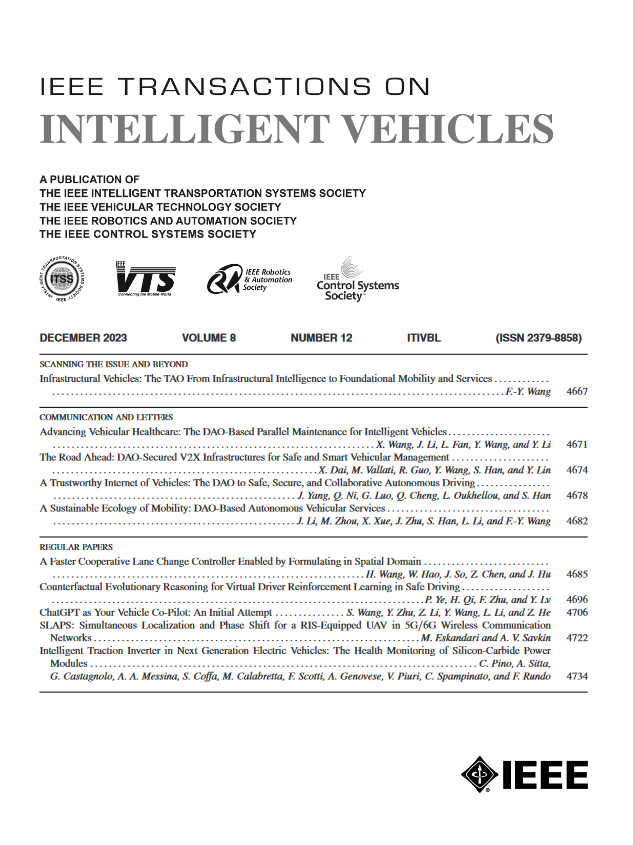在不确定环境条件下利用生态驾驶实现互联电动汽车和电池健康管理的节能解决方案
IF 14
1区 工程技术
Q1 COMPUTER SCIENCE, ARTIFICIAL INTELLIGENCE
引用次数: 0
摘要
采用节能驾驶方法可以充分发挥电动汽车的优势。这项工作采用多目标优化策略来执行生态驾驶,以降低电动汽车的能耗并延长电池的寿命。该问题共同考虑了相互冲突的约束条件,如交通信号、前车、速度和加速度限制、输入扭矩及其变化率检查以及电池 SoC 和充电/放电速率约束。这项研究还探讨了严格遵守一个约束条件会如何损害其他约束条件。采用 MPC 综合控制策略,将生态驾驶表述为非线性编程,并获得现实的最优解。所提出的策略成功地实现了生态驾驶,同时满足了不确定环境条件下所有相互冲突的约束条件。此外,还将结果与 PMP 进行了比较,以验证最佳解决方案。SoH分析表明,加入电池相关约束能改善电池的健康状况。最后,还进行了 Lyapunov 稳定性分析,以检验系统在参数不确定情况下的稳定性。本文章由计算机程序翻译,如有差异,请以英文原文为准。
Energy Efficient Solution for Connected Electric Vehicle and Battery Health Management Using Eco-Driving Under Uncertain Environmental Conditions
Adopting energy-efficient driving practices can harness the full benefits of EVs. This work uses a multi-objective optimization strategy to perform eco-driving to reduce the energy consumption of EVs and to prolong the health of batteries. The problem jointly considers constraints of conflicting nature; such as traffic signals, preceding vehicles, limitations on speed and acceleration, checks on input torque and its rate of change and bounds on battery's SoC and charging/discharging rates. This research also explores how adhering strictly to one constraint may compromise other constraints. A comprehensive control strategy using MPC is adopted to formulate eco-driving as nonlinear programming and to achieve a realistic and optimal solution. The proposed strategy has successfully achieved eco-driving along with satisfying all the conflicting constraints in uncertain environmental conditions. Furthermore, results are compared with PMP to validate the optimal solution. SoH analysis indicates that the inclusion of battery-related constraints improves the battery's health. Finally, Lyapunov stability analysis is conducted to check the systems' stability with parametric uncertainty.
求助全文
通过发布文献求助,成功后即可免费获取论文全文。
去求助
来源期刊

IEEE Transactions on Intelligent Vehicles
Mathematics-Control and Optimization
CiteScore
12.10
自引率
13.40%
发文量
177
期刊介绍:
The IEEE Transactions on Intelligent Vehicles (T-IV) is a premier platform for publishing peer-reviewed articles that present innovative research concepts, application results, significant theoretical findings, and application case studies in the field of intelligent vehicles. With a particular emphasis on automated vehicles within roadway environments, T-IV aims to raise awareness of pressing research and application challenges.
Our focus is on providing critical information to the intelligent vehicle community, serving as a dissemination vehicle for IEEE ITS Society members and others interested in learning about the state-of-the-art developments and progress in research and applications related to intelligent vehicles. Join us in advancing knowledge and innovation in this dynamic field.
 求助内容:
求助内容: 应助结果提醒方式:
应助结果提醒方式:


